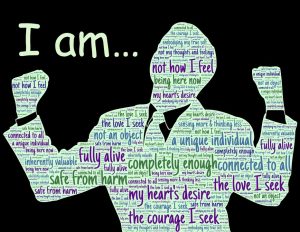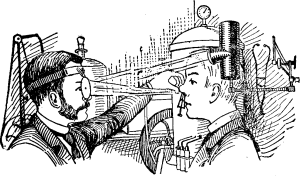 Humanistic and existentialist thinking might lead us to conclude that our sense of self is constructed from, among other things, being autonomous, being free thinking and being part of a community. More here!
Humanistic and existentialist thinking might lead us to conclude that our sense of self is constructed from, among other things, being autonomous, being free thinking and being part of a community. More here!
But just what is ‘self’ and why does it matter to us as social workers?
I wonder what your idea of your own ‘self’ is? Given you’re reading this blog you may define yourself as ‘social worker’ or ‘professional’. And obviously that will only be part of the story. You may also be a father, mother, son, or daughter, friend. Some of those words I’d also use to define myself. So, what makes me different to you and how do I know that I am different to you?
Psychologist Ulric Neisser (in an article in Being Human: The Inside Story of What It Means to be One of Us, New Scientist, The Collection, Volume 2 Issue 3, Reed Business Information Ltd., England (2015) gives us a multifaceted description of self.
You have an ecological self. You understand that you have a place because you have a point of view. How others respond to your point of view shapes something about you. Do others acknowledge your point of view? Does this validate who you are? How do you feel when someone criticizes your point of view? You also have a sense of your physical being and that there are rules about access to your body by others. There are acceptable things and unacceptable things defined by culture, the life experiences you have had, and by the age you are. When we think about supporting adults with disabilities these lines often become blurred due to the nature of the support that needs to be offered. The line between acceptable and unacceptable intimacy around personal care sit in a different place and in delivering such care concerns around lack of dignity need to explored.
You know your image in a mirror and the sound of your voice. You understand that others are physically different to you. You understand that they have a role, a purpose and that they also can make decisions to interact with you or not. This is your interpersonal self. You understand you can, and do, use your body language to try and influence the action of others. You generate ideas about how it might be for others born out of your own experiences. But caution! You can never know – not really – what it’s like for the other person. Similar experiences are not the same experiences. Avoid, “I know how you feel”!
Your existence is temporal, lasting only for a period of time. Fleeting, in terms of the ‘big picture’, you might say! But you are not just what you are now – you are what you have been. What you are going to be, or want to be, shapes you. The awareness of your potential future, or your aspirations, have great bearing on who you are in the here and now. So, consider then how this must be for people who, because of lack of opportunity, lack of support, disability, or lack of social status have their sense of self eroded by feeling their options for the future may be limited in some way. This ‘temporal self’ links to your conceptual self. You have an idea of who you are based on your life story, your personal goals, motivation and values. So in practice, when, for example, we think about making best interest decisions under the Mental Capacity Act it’s essential that we have not just an understanding of the risks associated with the decision, or the pertinent facts that relate to the situation, but also an understanding of the person’s values that have, and are being, shaped by their story. What would have been ‘driving’ them if they had been making this decision for themselves? This must be factored in so that when making a decision for someone lacking capacity we maintain them at the heart of the decision and don’t draw conclusions from our own value base, or as a consequence of risks that may well be professionally or organisationally constructed.
 So, existentialism underpins humanist ideas of self, about being free and autonomous but with responsibility. There is also a shared journey between us as social workers and the people we work with. There are some tensions created by the fact we work within often very inflexible, risk averse frameworks.
So, existentialism underpins humanist ideas of self, about being free and autonomous but with responsibility. There is also a shared journey between us as social workers and the people we work with. There are some tensions created by the fact we work within often very inflexible, risk averse frameworks.
Reflective practice definitely has its place here in our existentialist view of the world. Developing insight, through reflection is required so we understand what we are doing and most importantly why. Are we working to the service users agenda, our own, or our agencies? At best, in reality, it may be a combination. At worst the service users voice may be silent or misheard. Theory, research and practice wisdom, as well as knowledge from service users all have their place here.
Our work needs to be holistic, incorporating all the elements and taking a ‘big picture’ view so we capture an understanding of the essence of the person – where they have been, where they are at, and crucially where they want to go. As social workers we can’t just deal with situations from an objective viewpoint but have to understand the subjective dimension. We can only discover that by exploring the person’s sense of who they are and what they value before any decisions are made.

